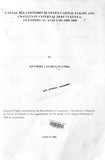| dc.contributor.author | Mayore, Kennedy L | |
| dc.date.accessioned | 2013-05-07T12:16:56Z | |
| dc.date.available | 2013-05-07T12:16:56Z | |
| dc.date.issued | 2001 | |
| dc.identifier.citation | Research Paper Submitted to the Department of Economics, University of Nairobi, in Partial fulfillment of the requirements for the award of the degree of Master of Arts in Economics | en |
| dc.identifier.uri | http://erepository.uonbi.ac.ke:8080/xmlui/handle/123456789/19841 | |
| dc.description.abstract | The phenomenon of capital flight and external debt has triggered a debate among analysts as to whether debt crisis predated capital flight or capital flight predated debt crisis. Some analysts claim that the international debt crisis in the early 1980s was a significant factor in the large scale capital flight during that period. Others have argued before the eruption of debt crisis, capital flight was in existence and contributed to developing countries' inability to meet their debt obligation, which eventually resulted into the debt crisis.
The uncontrolled capital flight and increasing debt burden coupled with dwindling real per capita incomes and generally unsatisfactory macroeconomic performances pose significant strains on the fiscal budgets and overall economic growth in many developing countries including Kenya. Most governments have undertaken reactive austere measures to sustain the provision of government services (in particular to the poor), inter-alia. However, these goals are potentially undermined by the recognized practice of capital flight and mounting external debt.
The study examines the twin issues using the Granger causality test to generate the missing knowledge for informed policy actions towards enhanced economic growth. We also examine the relative influence of other variables on capital flight. The study employs data from Kenya for the period 1980-2000. An appropriate econometric procedure is used to establish these relations and the results appraised on the basis of the standard diagnostic tests and economic theory criteria.
The results show that though changes in external debt and capital flight move together for the period under investigation there is however, no causal relationship that exists between the two as our empirical results suggests. In other words capital flight did not Granger cause external debt and neither did changes in external debt Granger-cause capital flight in the domestic economy. What we note is that changes in external debt, fiscal deficits both present and past compounded with other macroeconomic imbalances not withstanding some elements of political tension among other factors did have significant influence on capital flight during this period. This in essence implies that causality applies sin directly since it is not only one factor that give rise to capital flight. We therefore recommends-thai. appropriate domestic macroeconomic policies specifically those geared towards reduction in !~gn debt, fiscal deficits and creation of a conducive and stable investment environment coupled with political stability should be allowed to reign and be maintained at all times. | en |
| dc.language.iso | en | en |
| dc.publisher | University of Nairobi, | |
| dc.title | Causal Relationship Between Capital Flight and Changes in External Debt in Kenya: an Empirical Analysis 1980-2000 | en |
| dc.type | Thesis | en |
| local.publisher | Department of Arts-Economics | en |

